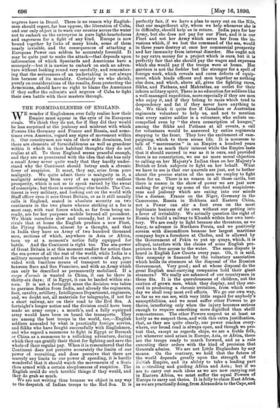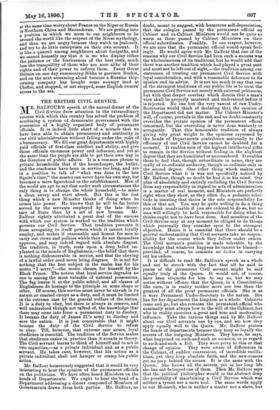THE FORMIDABLENESS OF ENGLAND.
WE wonder if Englishmen ever fully realise how their Empire must appear in the eyes of its European rivals. We think they do not, for if they did they would be less surprised at the jealousy and mistrust with which Powers like Germany and France and Russia, and some- times even America, regard any signs of movement within it. Our countrymen are vain of their wide dominion, but there are elements of formidableness as well as grandeur within it which in their habitual thoughts they do not realise at all. To them England seems peaceful enough, and they are so penetrated with the idea that she has only a small Army never quite ready that they hardly under- stand why the Continent should betray such a chronic fever of suspicion. It must, they say, arise from pure malignity. We quite admit there is malignity in it, a malignity arising from envy of an apparently endless prosperity, which is not so to speak earned by the sweat of conscripts ; but there is something else beside. The Con- tinent is very military, and looking out on the world with Staff officer eyes it sees Great Britain, or as it still usually calls it England, seated in absolute security on two continents in the two places whence striking at a foe is most easy, with vast forces which, so far from being un- ready, are for her purposes mobile beyond all precedent. We think ourselves slow and unready, but it seems to rivals that at home the English produce a new Fleet, the Flying Squadron, almost by a thought, and that in India they have an Army of two hundred thousand men, sections of which, anywhere in Asia or Africa, turn up at a moment's notice fully equipped for battle. And the Continent is right too. The sea-power of Great Britain is at this moment readier for action than the sea-power of all the rest of the world, while India is a military monarchy seated in the exact centre of Asia, pro- vided with limitless means of transport to any point between Suez and San Francisco, and with an Army which can only be described as permanently mobilised. If a corps d'armie is wanted in China, it can be there in thirty-six days ; if in Egypt, it can be landed within six- teen. It is not a fortnight since the decision was taken to garrison Suakin from India, and already the regiments, foot, cavalry, artillery, Intelligence Department, engineers, and, we doubt not, all materials for telegraphs, if not for a short railway, are on their road to the Red Sea. A fortnight's longer notice and the division could have been made an army corps ; a month's, and a fully equipped army would have been on board the transports. They are among the best troops in the world, too,—English soldiers annealed by what is practically foreign service, and Sikhs who have fought successfully with Englishmen, and who regard a summons to fight in Egypt or Burinah or China as a summons to a rollicking adventure, during which they can gratify their thirst for fighting and save the whole of their regular pay. When it is remembered that the Continent does not perceive accurately the limits of our power of recruiting, and does perceive that there are scarcely any limits to our power of spending, it is hardly wonderful that it should watch the movements of a State thus armed with a certain sleeplessness of suspicion. The English could do such terrible things if they would, and they do grab so much. We are not writing thus because we object in any way to the despatch of Indian troops to the Red Sea. It is perfectly fair, if we have a plan to carry out on the Nile, that our magnificent ally, whom we help whenever she is in difficulty, should help us in return. India pays for her Army, but she does not pay for our Fleet, and it is our Fleet and not her Army which saves her from the in- vasions which, if we lost the command of the sea, would in three years destroy at once her commercial prosperity and her immunity from internal disorder. She ought not to pay extra money for a project which is ours, but it is perfectly fair that she should pay the wages and expenses which she would pay if the troops were at home. Her garrison is not the feebler but the stronger for a spell of foreign work, which reveals and cures defects of equip. ment, which binds officers and men together as nothing else does, and which, above all, gives the fighting races, Sikhs, and Pathans, and Mahrattas, an outlet for their inborn military spirit. There is no education for soldiers like a well-managed expedition, more especially if they are men who enjoy it, and if they belong to races which tend to despondency and fat if they never have anything to do. We think it quite fine if Canadian or Australian regiments volunteer to help us, and not to mention that every native soldier is a volunteer, who enlists un- compelled even by "the stern conscription of hunger," among the Sikhs and Pathans at all events, a call for volunteers would be answered by entire regiments stepping to the front. They love the excitement of cam- paigning, which to them seems life. It is nonsense to talk of " mercenaries " in an Empire a hundred years old. It is as much their interest while the Empire lasts that it should succeed in war as it is ours, and provided there is no conscription, we see no more moral objection to calling on her Majesty's Indian than on her Majesty's British or Irish subjects to fight on her behalf. What we have to see is that our quarrels are just, not to bother about the precise status of the men we employ to fight them for us. There is no reason in all those cavils, but there is reason in the show of power we are just now making for giving up some of the wretched suspicious- ness and jealousy which are eating into our minds like a disease. France on the Niger, Germany in the Cameroons, Russia in Bokhara and Eastern China, not a Power can stir a foot even on the most legitimate business of its own without our getting into a fever of irritability. We actually question the right of Russia to build a railway to Khushk within her own terri- tory. We are ready to fight because she threatens, as we fancy, to advance in Northern Persia, and we positively scream with discomfiture because her largest maritime company buys a foreshore at Chefoo, and is allowed by the Government of Pekin to put up quays, which, it is alleged, interfere with the claims of some English pro- prietors to free access to the water. The same dispute is heard in English Law Courts every year. Oh, it is said, this company is financed by the voluntary association which holds its steamers at the disposal of the Russian Government. Very good ; and at whose disposal do the great English mail-carrying companies hold their giant steamers? We really are ashamed of our countrymen in these fits. It is the querulousness of children, not the caution of grown men, which they display, and they sue- ceed in producing a chronic irritation, from which some day we shall reap most evil effects. We go our own way, so far as we can see, with very little regard for anybody's susceptibilities, and we must suffer other Powers to go theirs, interfering only when the injury becomes serious enough to require something more dignified than shrill remonstrance. The other Powers suspect us at least as hotly as we suspect them, and with this extra justification, that, as they see quite clearly, our power reaches every- where, our broad road is always open, and though we pro- test, that, except as regards ships, we are a feeble folk, yet whenever need arises in Europe, Asia, or Africa, there are the troops ready to march forward, and as a rule executing their orders with the kind of precision that Generals admire. We are not Little Englanders by any means. On the contrary, we hold that the future of the world depends greatly upon the strength of the I;ritish Empire, and its ability to take a leading part in c..ntrolling and guiding Africa and Asia; but if we are to carry out such ideas as we are now carrying out in Eastern Africa, we must suffer the equal Powers of Europe to carry out theirs. It is folly to claim East Africa, as we are practically doing, from Alexandria to the Cape, and at the same time worry about France on the Niger or Russia in Northern China and Mazanderan. We are getting into a position in which we seem to our neighbours to lie around the world like the serpent of the Norse mythology, and then we are angry because they watch us jealously, and try to do little enterprises on their own account. It is like a quarrel among neighbours about footpaths, and we cannot honestly say that it is we who display either the patience or the fearlessness of the best caste, much less the tranquillity of those who are sure alike of their rights and of their power to enforce them. Fancy Great Britain on one day summoning Sikhs to garrison Suakin, and on the next screaming aloud because a Russian ship- owning company has bought some swampy land at Chefoo, and stopped, or not stopped, some English owners' access to the sea.







































 Previous page
Previous page